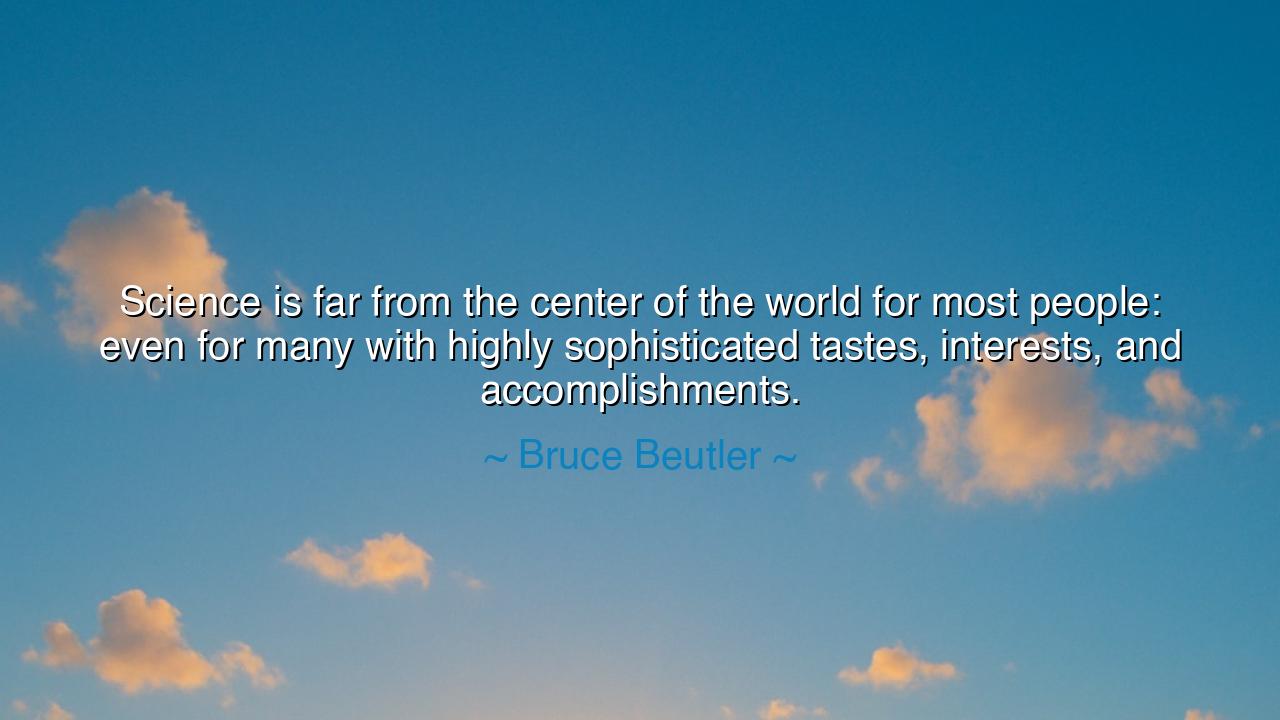
Science is far from the center of the world for most people: even
Science is far from the center of the world for most people: even for many with highly sophisticated tastes, interests, and accomplishments.






In the great dance of life, where minds and spirits strive to understand the nature of existence, there are many pursuits that claim our attention. Yet, Bruce Beutler offers a truth that cuts to the core of human experience: "Science is far from the center of the world for most people: even for many with highly sophisticated tastes, interests, and accomplishments." These words resonate deeply, as they reflect the tension between the knowledge that drives the world forward and the individual interests that shape our lives. Beutler’s insight reminds us that science, for all its power to transform and illuminate, does not occupy the central place in every heart. It is not the ultimate pursuit for everyone, even for those who have achieved great heights in other realms of human endeavor.
The ancient Greeks, in their search for wisdom, sought to understand the world not only through the lens of science, but also through philosophy, art, and human experience. Think of Socrates, whose life was not defined by the pursuit of material wealth or the understanding of the natural world, but by a deeper search for meaning in the human condition. To him, the questions of existence—virtue, justice, and the soul—were more pressing than the workings of the heavens or the earth. Plato and Aristotle too, though brilliant in their understanding of nature, placed human nature and the workings of the mind at the center of their inquiries. In this, they too remind us that science, while valuable, is but one thread in the grand fabric of human existence.
Beutler’s words echo a timeless truth—that science, though essential to the understanding of the universe, is not always at the heart of every person’s existence. For many, the arts provide a deeper, more immediate connection to the world. The poets, the musicians, and the artists of all ages have found in their creations a way to express the beauty, the pain, and the triumph of the human spirit. The great epic poets of antiquity, such as Homer, did not measure the success of their lives in scientific terms, but in the stories they told and the emotions they stirred in their listeners. Shakespeare, too, wrote not with an eye toward scientific discovery, but with a heart that sought to understand the human experience in all its complexities.
Consider, O children of the future, the Renaissance thinkers, whose minds sought to bridge the gap between science and art. Figures like Leonardo da Vinci understood that knowledge was not confined to one realm alone. Da Vinci, a master of art, also sought to understand the human body, the heavens, and the earth. But even in his scientific explorations, he remained deeply connected to the world of aesthetics and the human condition. He blended the realms of beauty and reason, showing that neither science nor art could stand alone—they must be united in the pursuit of truth. Yet, for many, art and human expression remain the center of existence, while science is but a means to an end, a tool to understand the world, not to define it.
Beutler’s insight reveals the tension that exists in every era between the practicality of science and the subjectivity of human experience. While science has allowed humanity to reach great heights—sending us to the moon, unraveling the mysteries of the atom, and extending the lifespan of our species—it does not always speak to the deepest longings of the human heart. Many people, even those of great intelligence, find more meaning in the pursuit of the arts, in the exploration of the soul, or in the quest for personal fulfillment, than in the cold facts of the natural world. For these individuals, life is measured not by scientific achievement, but by the experiences, relationships, and dreams that shape their days.
The lesson of Beutler’s words is this: balance is key. While science plays a central role in the advancement of our civilization, it must not eclipse the other aspects of life that make us fully human. It is in the balance between the rational and the emotional, the logical and the creative, that we find the true meaning of existence. Science may teach us about the universe, but it is art, philosophy, and human experience that teach us what it means to live within it.
O children of the future, remember this: while the pursuit of knowledge through science will guide you to great discoveries, never forget the importance of the heart, of human connection, and of the things that cannot be measured by equations or experiments. Seek not to elevate one above the other, but to live with wisdom, embracing both the brilliance of science and the beauty of human expression. Just as the great thinkers of the past did, so must you understand that the full richness of life cannot be contained in any one pursuit. Let your hearts and minds be open to all that the universe offers, knowing that both science and art are but reflections of the same eternal truth.






AAdministratorAdministrator
Welcome, honored guests. Please leave a comment, we will respond soon